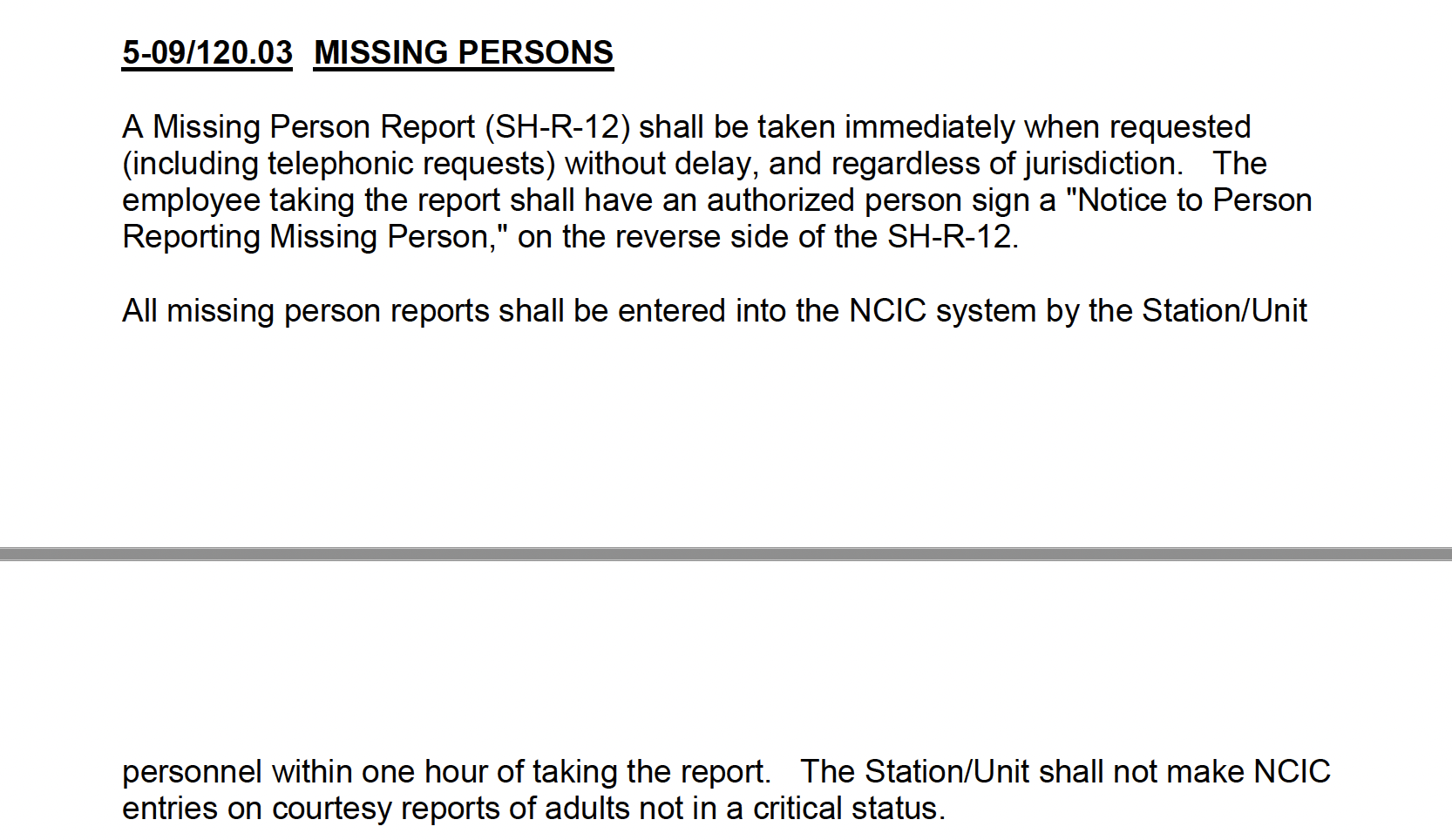The Disappearance: A Comprehensive Guide To Missing Person Investigations

Table of Contents
The Initial Stages of a Missing Person Investigation
The initial hours and days are critical in a missing person investigation. Swift action significantly increases the chances of a successful resolution.
Reporting a Missing Person
Immediate reporting is paramount. Contact your local police department first. If the missing person is believed to have crossed state lines or international borders, notification of the relevant federal agencies (like the FBI in the US) may also be necessary. Many countries also have national missing person hotlines.
-
Information Needed for the Report:
- Full name, date of birth, and physical description (height, weight, hair color, eye color, any distinguishing marks or tattoos).
- Last known location, including the exact address and time of last sighting.
- A detailed timeline of the individual's activities leading up to their disappearance.
- Names and contact information of potential witnesses.
- Any known medical conditions or medications the missing person is taking.
- Photos: Recent and older photos are invaluable.
- Personal belongings: Any items that might provide clues.
-
Preparing Before Contacting Authorities: Gather all relevant information before calling. Having a clear and concise account will expedite the process.
The Preliminary Investigation
Law enforcement will launch a preliminary investigation, focusing on several key areas:
- Interviews: Family members, friends, coworkers, and anyone who had recent contact with the missing person will be interviewed.
- Social Media and Digital Footprint: Online activity, including social media posts, emails, and online searches, will be reviewed to gather clues.
- Financial Records: Banks and credit card companies will be contacted to check for recent transactions.
- Vehicle and Travel Records: Authorities will investigate recent travel plans and vehicle usage.
The approach will vary depending on factors such as the age of the missing person. Investigations involving minors often involve more immediate and extensive resources than those involving adults. Different agencies, including local police, state police, and the FBI (in the US), may become involved depending on the circumstances and the scope of the investigation.
Advanced Investigative Techniques in Missing Person Cases
Modern missing person investigations leverage advanced technologies and investigative techniques.
Utilizing Technology
Technology plays a crucial role in modern investigations:
- Databases: National and international missing person databases are crucial for cross-referencing information and identifying potential matches.
- Facial Recognition Software: This technology helps compare images of the missing person to photographs or video footage from various sources.
- Social Media Analysis: Social media platforms can provide valuable clues about the missing person's relationships, activities, and potential whereabouts.
- Cell Phone Tracking: With proper legal authorization, cell phone data can help pinpoint the missing person's last known location.
- Drone Technology: Drones are increasingly used for search and rescue operations, covering large areas quickly and efficiently.
While incredibly useful, technology's use is subject to legal limitations and privacy concerns. Warrants and other legal processes are often required to access private data.
Psychological Profiling and Investigative Psychology
Psychological profiling can be invaluable in understanding the missing person's behavior and predicting potential scenarios. Profilers analyze the individual's personality, past behavior, and relationships to develop hypotheses about their possible actions and motives.
- Profiling Techniques: Various techniques are employed, ranging from geographical profiling (analyzing the spatial patterns of the case) to victimology (studying the characteristics of the missing person).
- Expertise: Accurate psychological profiling requires specialized training and experience.
- Narrowing Down Scenarios: Profiles can help investigators focus their efforts on the most likely scenarios, saving time and resources.
Resources and Support for Families of Missing Persons
Navigating the emotional and logistical challenges of a missing person case is incredibly difficult for families. Numerous resources and support networks are available.
National and International Organizations
Several organizations offer vital support and resources:
- The National Center for Missing and Exploited Children (NCMEC) (US): Provides resources and support for families of missing children. [Link to NCMEC website]
- [Insert relevant organizations for other countries/regions]: Research your local and national resources for support.
These organizations often provide:
- Emotional Support: Counseling and support groups for families dealing with the stress and trauma of a missing person.
- Legal Advice: Assistance in navigating the legal complexities of missing person cases.
- Investigative Assistance: Some organizations offer assistance in conducting independent investigations.
- Financial Aid: Financial support may be available to assist families with expenses related to the search.
Advocacy and Legal Assistance
Legal representation can be crucial in protecting the rights of families and ensuring that the investigation is conducted thoroughly.
- Roles of Legal Professionals: Lawyers specializing in missing persons cases can assist with navigating legal processes, obtaining necessary legal documentation, and representing families in legal proceedings. Private investigators can supplement law enforcement efforts.
- Civil vs. Criminal Aspects: Missing person cases can have both civil and criminal implications, requiring specialized legal expertise.
- Protecting Family Rights: Legal counsel ensures that the rights of the family are protected throughout the process.
Conclusion:
Successfully resolving missing person investigations requires a multifaceted approach. From the crucial initial steps of reporting a missing person to utilizing advanced technologies and psychological profiling, each stage is vital. Remember, utilizing available resources and seeking assistance from relevant organizations significantly increases the chances of a positive outcome. If you are involved in a missing person case, act swiftly and seek professional help immediately. Learn more about effective strategies for missing person investigations and utilize the resources available to support loved ones and enhance the chances of a safe return. Don't hesitate to contact the authorities and appropriate support networks if you have information about a missing person. Every piece of information, no matter how small, can help bring someone home.

Featured Posts
-
 Bourse Payot 2024 Hugo De Waha Laureat Du Concours De Journalisme
May 26, 2025
Bourse Payot 2024 Hugo De Waha Laureat Du Concours De Journalisme
May 26, 2025 -
 Naomi Kempbell I Ee Deti Novye Foto Podogrevayut Slukhi O Romane S Millionerom
May 26, 2025
Naomi Kempbell I Ee Deti Novye Foto Podogrevayut Slukhi O Romane S Millionerom
May 26, 2025 -
 Pobediteli 47 Go Mmkf Tseremoniya Nagrazhdeniya V Moskve
May 26, 2025
Pobediteli 47 Go Mmkf Tseremoniya Nagrazhdeniya V Moskve
May 26, 2025 -
 Herzliyas Salon Yevani A Restaurant Review
May 26, 2025
Herzliyas Salon Yevani A Restaurant Review
May 26, 2025 -
 Chinese Tennis Ace Triumphs In Rome Advances To Quarters
May 26, 2025
Chinese Tennis Ace Triumphs In Rome Advances To Quarters
May 26, 2025
